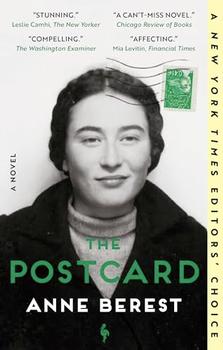Summary | Excerpt | Reading Guide | Reviews | Beyond the Book | Readalikes | Genres & Themes | Author Bio

I observed.
My father held it up to the light and looked at it carefully for a few moments before declaring that the photograph dated from the 1990s. The print's chroma, with its saturated magentas, as well as the absence of advertising panels around the Opéra Garnier, confirmed my hunch.
"I'd even say it's from the early '90s," my father clarified. "How can you be so sure?" my mother asked.
"Because in 1996 the green and white SC10 buses, like the one in the middle ground of this picture, were replaced by RP312s. With a platform. And their engines in the rear."
No one was surprised by my father's knowledge of Parisian bus history. He'd never driven a car, much less a bus, but his career as a researcher had led him to learn countless details on a myriad of subjects as varied as they were specialized. My father invented a device that calculates the moon's influence on Earth's tides, and my mother has translated treatises on generative grammar for Chomsky. Both of them know an unimaginable number of things, almost all of which are completely useless in everyday life—most of the time. But not that day.
"Why write a postcard and then wait ten years to send it?"
My parents continued their musings. But I couldn't have cared less about the postcard itself. No—it was the names that were calling to me. These people were my ancestors, and I knew nothing about them. I didn't know which countries they'd traveled to, what they'd done for a living, how old they'd been when they were murdered. I couldn't have picked them out of a photo lineup.
I felt a wave of shame.
After lunch, my parents put the postcard away in a drawer, and we never talked about it again. I was twenty-four years old, my mind full of my own life, of other stories to be written. I erased the recollection of the postcard from my memory, though I kept hold of the vague intention to ask my mother, one day, about our family's history. But the years slipped by, and I never took the time to do it.
Until ten years later, when I was about to give birth.
My cervix had dilated too early, so I was on bedrest to keep the baby from arriving prematurely. My parents had suggested that I spend a few days at their house, where I wouldn't have to lift a finger. Suspended in a state of anticipation, my thoughts turned to my mother, my grandmother, and the whole line of women who had given birth before me. It was then that I felt a pressing need to hear the story of my ancestors.
Lélia led me into her study, where she spends most of her time. The little room always reminded me of a womb, its air thick with cigarette smoke, its walls lined with books and filing cabinets and bathed in the pale winter sunlight that streamed through windows overlooking the Parisian banlieue. I settled myself beneath the bookshelf and the ageless objects on it, all those memories blanketed with a film of dust and cigarette ash, as my mother retrieved a black-speckled green archive box from among twenty identical ones. As a teenager, I'd known that these neat rows of boxes contained the relics of our family's dark past. They'd made me think of little coffins.
My mother reached for a pen and a sheet of paper—like all re- tired professors, she views everything as a teaching opportunity, even parenting. Lélia's students at Paris 8 University Vincennes- Saint-Denis adored her. Back in the good old days, when she could smoke in the classroom, she used to do something that fascinated her linguistics students: with rare dexterity, she could finish an entire cigarette without the ash dropping to the floor, keeping the thin gray cylinder between her fingertips. No need for an ashtray, she'd set the worm of ash down on her desk, delicately, and light up another one. It was a skill that demanded respect.
"I should warn you," she began now, "that what I'm about to tell you is a blended story. Some of it is obviously fact, but I'll leave it up to you to decide how much of the rest comes from my own personal theories. And of course, any new documentation could flesh out those conclusions, or change them completely."
Excerpted from The Postcard by Anne Berest, originally published as La carte postale, copyright Anne Berest 2021. Translation by Tina Kover, copyright 2023 Europa Editions.
Your guide toexceptional books
BookBrowse seeks out and recommends the best in contemporary fiction and nonfiction—books that not only engage and entertain but also deepen our understanding of ourselves and the world around us.